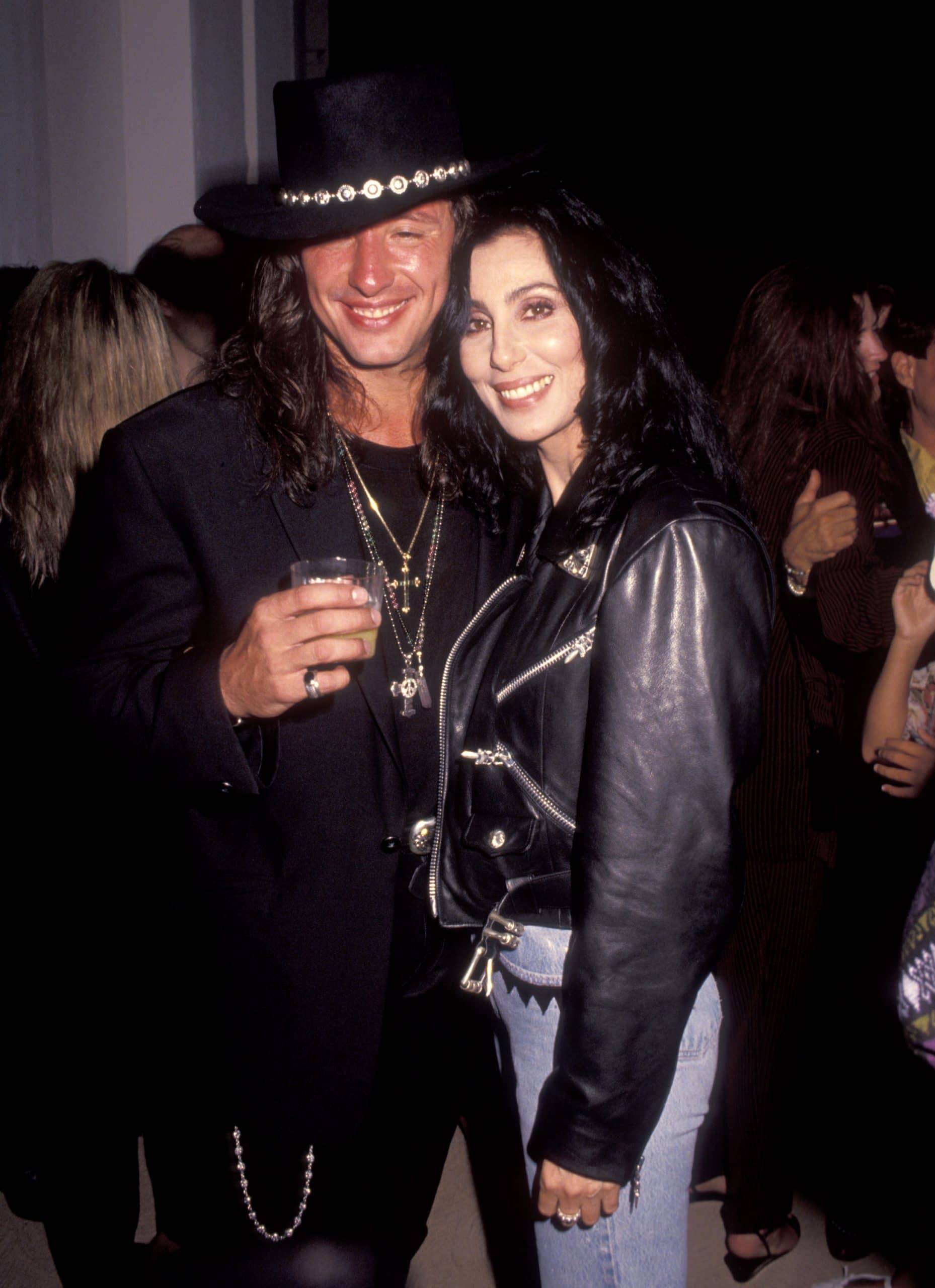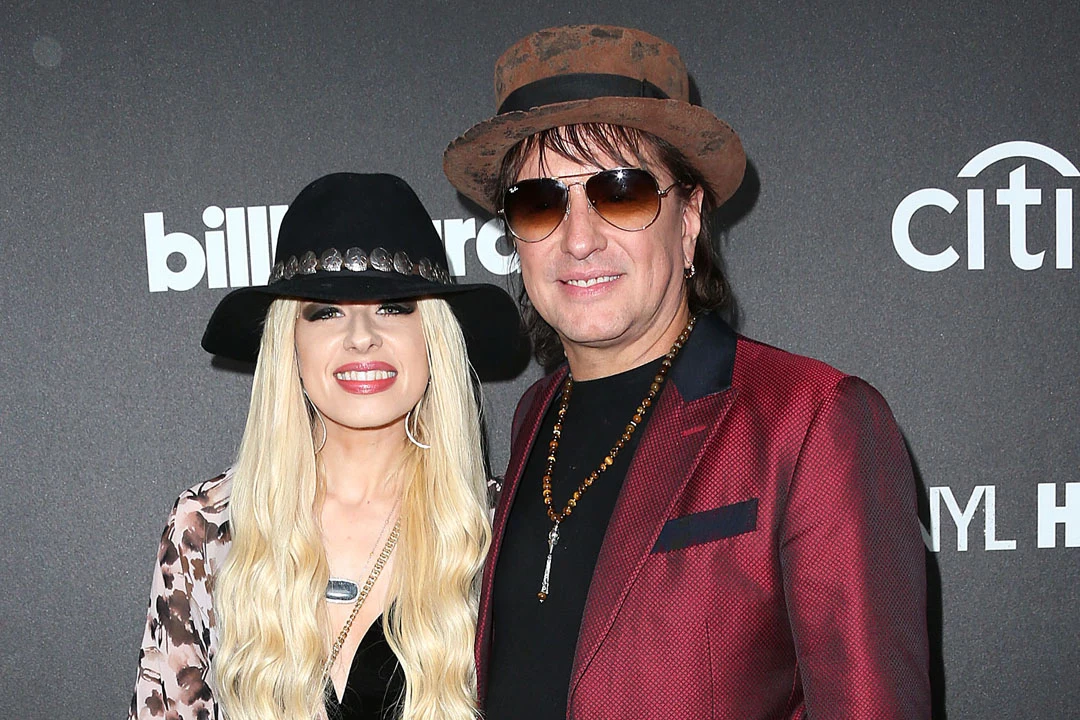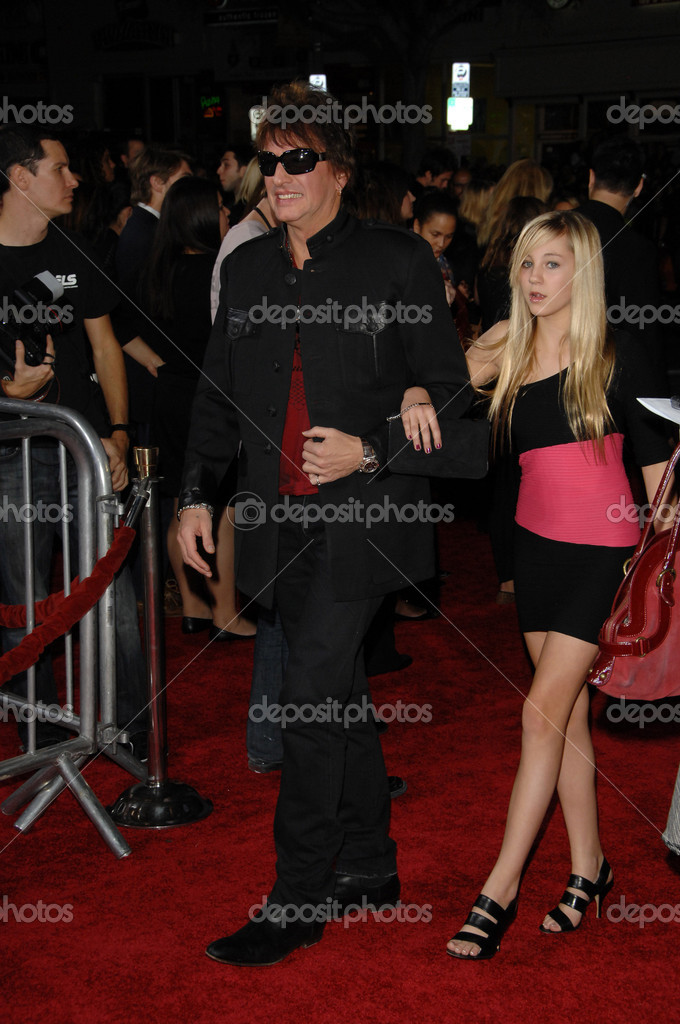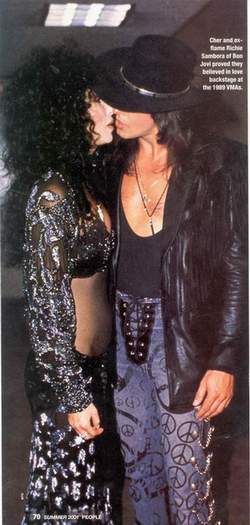Sambora joined Bon Jovi in 1983, replacing the band's original lead guitarist Dave Sabo, who went on to form Skid Row. Alec John Such had been playing in a band with Sambora and joined Bon Jovi while Sambora was away in Los Angeles auditioning for Kiss. When Sambora returned home, Such promptly invited him to see the band play.
Sambora was impressed with Bon Jovi after seeing the band perform live, describing the band as "magic", and he subsequently approached Jon Bon Jovi backstage and "gave him a verbal résumé". Though Sambora initially believed Bon Jovi wasn't interested in him, he received a phone call several days later inviting him to rehearse with the band. When Jon arrived and heard the band with Sambora, he hired him on the spot. That night, the pair returned to Bon Jovi's mother's house and wrote the songs "Come Back" and "Burning for Love", both of which would appear on the band's 1983 debut album.
Sambora's first instrument was the accordion which he began to play at the age of 6. He began playing the guitar at the age of 12 following the death of Jimi Hendrix in 1970. From his early days, Sambora was strongly influenced by blues and 1960s rock and roll. His most important influences were Eric Clapton, Jimi Hendrix, Jeff Beck, Stevie Ray Vaughan, Johnny Winter, Jimmy Page, Joe Perry, Joe Kmiecik, George Harrison, and B. He was also influenced by Spanish classical music and began a lifelong love of the Spanish guitar.
Furthermore, he had stated that psychedelic soul singer Janis Joplin had a big influence on his musical style during her career in the late 1960s and early 1970s. Classical music directly inspired several of his songs, such as The Answer which was originally written on piano. Sambora also plays many other instruments, such as drums, bass, saxophone, piano etc. The first time he performed on stage was at a Catholic Youth Organization dance when he was a teenager. Sambora's first solo album was 1991's Stranger in This Town, a blues-influenced album that charted at No. 36 on the Billboard 200 and No. 20 on the UK Albums Chart.
The lead single, "Ballad Of Youth", reached a high of No. 63 on the U.S. "One Light Burning" was released as the second single and the album titled track, "Stranger In This Town" as the third which charted at No. 38 on the Mainstream rock charts. Eric Clapton played the lead guitar on the promo single Mr Bluesman, backed by Sambora on acoustic guitars. Sambora did a short US tour in support of the album, featuring Tony Levin , Dave Amato , Crystal Taliefero and Bon Jovi bandmates Tico Torres and David Bryan . The track "Rosie" was co-written by Jon Bon Jovi and was initially intended for the fourth Bon Jovi album New Jersey.
"Ballad of Youth" was released in the UK in summer 1991 and despite plugs from The Friday Rock Show on BBC Radio 1 the song barely skimmed the top 75. After the success of 'Crush,' Bon Jovi didn't waste any time working on a new album and would release 'Bounce,' their eighth studio album, two years later. The lead single was the uplifting fist-pumper "Everyday," which had a little bit more of a hard rock edge than expected but didn't lack the band's pop-rock sensibilities.
It's another song of Bon Jovi's from the aughts you ought to revisit. While 'Burning Bridges' was primarily made up of unreleased and unfinished songs, "We Don't Run" was one of the very few songs that was actually written for the contractually obligated album. Jon Bon Jovi co-wrote the song with producer John Shanks who played lead guitar on the album following the exit of Richie Sambora. Due to the underlining tension surrounding the LP's release, "We Don't Run" perhaps didn't get a fair enough shake as a single, but it's one hell of a driving anthem with an outstanding rhythm track from Tico Torres and Hugh McDonald. If you were shocked by Richie Sambora's seemingly sudden departure from Bon Jovi in 2013, don't worry – you're not alone. I'm going to New York for a writing session with Desmond and Jon at Desmond's apartment.
Traffic total stop, someone's car died or something like that. I don't know how long it took me to get out of there. And I went, "What are you guys writing? Play it for me." And I'll sing it for you if you like.
"She had a blue tattoo on the back of her hand that said, 'I love you, mommy and dad'" "Jon, you sing it." "I don't want to hear you sing it." We got to bring guys in. And Jon and I got in a cab and I said, "Wow, that's the best song we've ever written." He says, "Ah, I think it'll be good for a movie sound track or something like that." And he tells that story on stage too, every night. I said, "What are you saying that for?" So I said, "If I buy you dinner, can we finish it?" So I took him out and bought him dinner, and then we finished it. Richie and Jon were the core songwriting team behind almost all of Bon Jovi's music.
He joined the band after replacing the group's original guitarist, and wrote many of the songs on their debut album. After that, the rest was history, and he spent three decades making music with Jon and the rest of the band. As previously reported in the spring of 2013, Richie — Bon Jovi's lead guitarist — did not announce his decision to bow out of the legendary rock band's Because We Can tour.
What Happened To Richie Sambora And Orianthi "Due to personal issues, Richie Sambora will not be performing on this upcoming leg," a statement on the band's website read that April. A few months later, per People, Sambora spent an additional week in rehab at Utah's Cirque Lodge facility. Addiction recovery is a journey, and sometimes that road is rocky. According to TMZ, Sambora had to admit himself to a drug treatment center once more in 2011.
Well, I thought if the band was going to have any longevity, we needed a banner song for guys. And I got stoned one day, and I was sitting in my mother's basement waiting for Jon to bring me a pizza so we could get going. And I came up with that riff and I went, "Well, that's pretty easy." And it's a very simple riff. It seems like it's hard to play, it's not hard to play at all. And it made girls able to bring their husbands, and their boyfriends, and they didn't feel like they had to go hide someplace.
It was us rolling into truck stops, that long hair, and you'd hear on the CB, "You see one of the long hairs walking around." We didn't give a - . He says, "Hey boss, you feel like shooting some up?" Be in the middle of Utah someplace. He goes, "All right, I'll give you about 15 minutes to get ready, you know where it is." We're all like... We're painting our faces, mowing down cactuses and we weren't hurting anybody or anything like that. That's the kind of thing when you're on tour when you're young like that.
There was times like that where the camaraderie was very, very deep. In 2000, Taylor started the production of a Richie Sambora signature model, a six-string acoustic made of koa wood, called the RSSM. All of his double-neck acoustics feature a six-string neck on top and a 12-string neck on bottom, opposite of normal.
Sambora's guitar solo in the song "Bullet" from the 2009 album The Circle was played through a Dunlop Cry Baby wah pedal. Undiscovered Soul was Sambora's second solo album, released in 1998. The album charted at No. 174 on The Billboard 200 and No. 24 on the UK Albums Chart.
The lead single "Hard Times Come Easy" charted at No. 39 on the Mainstream rock chart and No. 37 in the UK, the second single "In It For Love" charted at No. 58 on the UK Singles Chart. The title track "Undiscovered Soul" and "Made in America" were also released as singles. In support of Undiscovered Soul, Sambora toured Japan, Australia and Europe in the summer of 1998. The band featured Richie Supa , Ron Wikso , Kasim Sulton , Tommy Mandel , Everett Bradley (percussion; Japan only), Gioia Bruno (percussion; Australia only) and Crystal Taliefero (percussion; Europe only). Sambora left the band in 2013 prior to a concert in Calgary during the band's Because We Can tour.
Since his departure, Sambora has only played with Bon Jovi at their Rock and Roll Hall of Fame Induction in 2018. In 2016, Sambora stated that his reason for leaving the band was in order to give his family more of his attention. "I really needed to take some time to be with my daughter," he stated "She needed me and I needed her, actually." In 2013, guitarist Richie Sambora abruptly quit the band. "Everything was great, and we were just coming off a break, but he never came to work again," Bon Jovi told The Mirror. However, Bon Jovi included McDonald as a studio musician at the time of "Slippery When Wet"'s release, with Richie Sambora and Alec John Such playing lead and bass guitar, respectively.
Bon Jovi has released a total of 14 studio albums, three live albums and five compilation albums. John Bongiovi jnr was born and raised in New Jersey, the son of two former marines. He started making music as a kid and wrote Runaway, which would be his first hit, when he was 19. By 21 he had a record deal and a band, of which he was the name, the face and the boss.
("More like a benevolent dictator," he insists.) Initially they were marketed as a hard-rock band. They certainly looked the part – big hair, tight trousers – but Bon Jovi had a different plan. It was make or break time for Bon Jovi on their third studio album. They needed something big, and they got that and then some with "You Give Love A Bad Name." The track was the lead single from 'Slippery When Wet' and was one of four songs Jon Bon Jovi and Richie Sambora co-wrote with Desmond Child.
The song would become Bon Jovi's first number one hit and help skyrocket them to rock superstardom. The words echo what a source close to the family told the same magazine in October, shortly after the family celebrated the 23rd birthday of Ava, who graduated from Loyola Marymount University earlier in the year. "It was the right decision to step off the stage to be a full-time father," explained the source. "At the end, he was suffering being on the road so much. Richie has no regrets about leaving the band." It isnt easy to just cancel or postpone a tour, lots of fans come to concerts from all over, they have tickets airline tickets sometimes,etc...there are a lot of people who work with bon jovi, not just the band members.
If they postpone some fans will be upset if they dont others will be upset. According to the Hollywood Reporter, the 54-year-old guitar player has remained mostly quiet on what many thought was his temporary departure from the band. He has talked a bit about his most recent solo album, "Aftermath of the Lowdown." Earlier this month, the New Jersey native shared a new song, "Come Back as Me" that, contrary to what some believed, was not about Bon Jovi.
After a few of the worst years of his life, Sambora feels like "Lowdown" is a song of experience — and innocence as well. Most famous musicians would go out of their way to hide a night like that, or at least couch it in some traditional narrative of redemption on record. But on Sambora's new, unexpectedly bloodletting third solo album, "Aftermath of the Lowdown," he tackles that time in his life with plain-spoken, unsentimental rock music that doesn't whitewash or over-dramatize his failings.
Richards says she believes she and Sambora met and started dating when they did because they were meant to support each other emotionally. "It's often hard to contemplate the workings of fate, but this wasn't one of those times," wrote Richards. A founding member of one of the world's biggest bands, Bon Jovi's Richie Sambora is also guitarist royalty.
When the boys passed through the Bell Centre this year, we sat down with the 51-year-old rock icon to find out just how big a sports nut he really is, and what's next for one of the most enduring acts in music history. While on a hiatus in the early '90s and before recording its fifth studio album Keep the Faith, Bon Jovi's members pursued various projects. Jon Bon Jovi recorded his solo debut Blaze of Glory, and Richie Sambora made his record, Stranger in This Town. Bon Jovi keyboardist David Bryan played all over Sambora's album while also recording a soundtrack for the movie Netherworld ... And he also spent a large portion of the Bon Jovi hiatus recovering from parasites he believes he acquired when the band toured through South America. Jon Bon Jovi and his eponymous band toiled for years to make it big, and they finally did when back-to-back singles "You Give Love a Bad Name" and "Livin' on a Prayer" topped the Billboard Hot 100 singles chart.
The band worked hard to break through, playing concerts around the world for the better part of 1985, followed in close succession by the release of Slippery When Wet and the support tour that took up most of 1986 and 1987. Plus, they had to prepare to head into the studio to record the 1988 album New Jersey. Of course, while money and fame can make life a lot easier, they don't fix all your problems. And even if you're incredibly talented, you"ll still struggle with an incredible amount of grief. The core members of the band are in their 50s and 60s now, and they've lived lives as hard or even harder than the people they write songs about. In other words, these rockers have dealt with some serious tragedies.
Here are some of the darker and more challenging moments in the otherwise sunny lives of the members of Bon Jovi. Kicked out of art school in 1961, Clapton was told he had to work for his granddad Jack Clapp if he was to carry on living under the same roof as him and wife Rose. She didn't make a record for six years, but she won the Oscar.
And so Clive was giving a lot of work back then as a producer, because he was hot. And he said, "By any chance Jon," you know how he goes, "I can't get nobody to do the Cher record." I said, "I'll do it. I got a song, ready to go." I get done three days. "Can I put you down?" I said, "Yeah." And then everybody got on board. As a member of Bon Jovi, Sambora collected more than seventy gold and platinum CDs. "Obviously it hurts and you know, breaking up is hard to do," Sambora explained.
"I was in a situation and it was not easy to make that decision to leave the band and the fans. … I was in a dire situation with my family, and I had to make a tough decision and I did and I'm sure people weren't happy about it." Back in April many Bon Jovi fans were left disappointed when Richie Sambora pulled out of the'Because We Can'world tour. At the time the guitarist cited 'personal issues' as the reason he could not continue with the band. However rumours were abound that he was just not getting enough dough. In 1999, Sambora was a guest vocalist on the Stuart Smith album Stuart Smith's Heaven & Earth, performing a cover of the Deep Purple song "When a Blind Man Cries".
Also in 1999, Sambora played the guitar solo on the track "Why Don't You Love Me" on the album Tuesday's Child, by Canadian singer Amanda Marshall. The track "Every Road Leads Home to You" was released as a single for the album and features a music video. The song is also featured as one of the bonus tracks on Bon Jovi's 2013 album What About Now.
A special edition single, "I'll Always Walk Beside You'" featuring Alicia Keys was released as the second single of the album. All the profits from the sale of the special edition single goes to the ongoing recovery efforts of The Red Cross for the devastation from Hurricane Sandy. The track "Sugar Daddy" was released as a promo single and a music video was made for the song "Taking a Chance on the Wind". According RumorFix.com, Sambora's departure is indeed about money.




























No comments:
Post a Comment
Note: Only a member of this blog may post a comment.